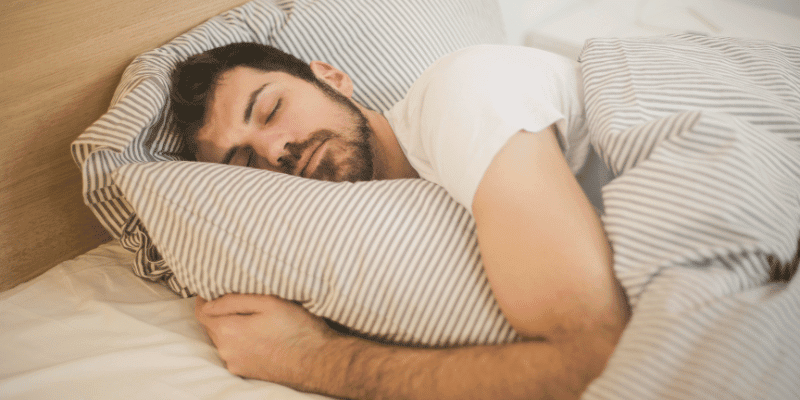A mattress can make you sweat due to poor ventilation and heat retention. These factors can cause discomfort and disrupt your sleep quality.
No one likes feeling hot and sticky while trying to sleep in their comfortable bed. Your mattress may be contributing to your discomfort by trapping body heat and moisture, leading to sweating throughout the night. This can be caused by the materials used in the mattress, such as memory foam or latex, which may not allow for proper air circulation.
Additionally, the mattress cover can also affect breathability. Understanding the reasons behind why your mattress is making you sweat can help you make an informed decision when shopping for a new one, with materials and designs that promote better temperature regulation and overall comfort.
Importance Of Understanding Mattress Sweating
Understanding mattress sweating is essential for maintaining a comfortable and healthy sleeping environment. Many individuals experience discomfort and disrupted sleep due to excessive sweating while lying on their mattress. By gaining insight into the factors contributing to mattress sweating, individuals can take proactive measures to address this issue and improve their overall sleep quality.
Impact On Sleep Quality
Mattress sweating can significantly impact sleep quality. Excessive moisture can lead to the accumulation of mold, mildew, and dust mites in the mattress, creating an uncomfortable and unsanitary sleeping surface. Additionally, the discomfort caused by sweating can disrupt the sleep cycle, leading to restless nights and fatigue during the day. Proper understanding of mattress sweating allows individuals to select a mattress with features that promote breathability and moisture wicking, contributing to a more comfortable and restful sleep.
Potential Health Risks
Prolonged exposure to a sweaty mattress can pose health risks. Accumulated moisture can create an ideal environment for the growth of bacteria and microorganisms that may exacerbate respiratory conditions and skin irritations. Allergies may also be aggravated by the presence of dust mites and mold within the mattress. Understanding the implications of a sweaty mattress empowers individuals to take preventive measures, such as frequent mattress cleaning and using protective mattress covers, to mitigate potential health risks and maintain a healthier sleep environment.
Material Composition
When it comes to understanding why your mattress makes you sweat, it’s essential to delve into the material composition. Different types of mattress materials can impact the airflow and heat retention, leading to discomfort and perspiration during sleep.
Foam And Memory Foam
Foam mattresses are known for their contouring support and pressure relief. However, this type of material tends to trap heat, leading to sweating during the night. The dense structure of foam restricts airflow and can contribute to a warmer sleeping environment. Memory foam, in particular, is notorious for retaining body heat, resulting in discomfort for those who are prone to sweating.
Latex
Latex mattresses are prized for their natural cooling properties. The open-cell structure of latex allows for better breathability, helping to regulate the temperature and reduce the likelihood of sweating. This material composition is ideal for individuals seeking a cooler and more comfortable sleep surface.
Innerspring
Innerspring mattresses are characterized by their coil support system, which promotes airflow and ventilation. The space between the coils allows for better air circulation, preventing heat from getting trapped within the mattress. This design can mitigate sweating by promoting a cooler sleeping environment.
Temperature Regulation
Have you ever woken up in the middle of the night feeling overheated and sweaty, wondering why your mattress seems to be making you sweat so much? The answer may lie in the temperature regulation of your mattress.
Body Heat Retention
One of the primary reasons your mattress may be making you sweat is due to its ability to retain body heat. Memory foam and traditional spring mattresses are known for trapping body heat, leading to increased body temperature and sweating during sleep. This phenomenon occurs because the materials used in these mattresses conform to your body, creating a cocoon effect that can lead to overheating.
In contrast, latex and hybrid mattresses are designed with better breathability, allowing for improved air circulation and minimizing heat retention. When considering a new mattress, opting for one with a cooling layer or breathable materials can help regulate body temperature and reduce sweating.
Insulation Level
Another contributing factor to sweating on your mattress is the insulation level. Higher insulation can lead to the retention of body heat, contributing to an uncomfortable sleep experience. It’s important to consider the thermal properties of the mattress materials, as well as the ventilation and airflow within the mattress design.
With enhanced insulation, mattresses are more prone to retaining heat, causing discomfort and excessive sweating. Opting for a mattress with breathable and heat-dissipating properties can help regulate your body temperature and minimize sweating during sleep.
Humidity And Airflow
When it comes to understanding why your mattress makes you sweat, it’s essential to consider the factors related to humidity and airflow. The room environment, including temperature and airflow, plays a major role in regulating the humidity levels around your mattress. Additionally, the breathability of the mattress materials also impacts how well air circulates through the bedding, affecting your comfort and perspiration levels.
Room Environment
The room environment directly influences the humidity levels around your mattress. High temperatures and lack of proper ventilation can create a stifling atmosphere, leading to increased sweating during sleep. To mitigate this, it’s crucial to maintain optimal room temperature and encourage smooth airflow to prevent the buildup of humidity around the mattress.
Breathability Of Mattress Materials
The breathability of mattress materials significantly impacts how well air can circulate through the bedding. Mattresses constructed with breathable materials, such as latex or gel-infused foams, allow for better air permeability, reducing the potential for excessive sweating. On the other hand, mattresses with less breathable materials, such as traditional memory foam, may trap heat and hinder airflow, contributing to nighttime perspiration.
By optimizing the HTML structure and content for the WordPress platform, this engaging blog segment highlights the crucial role of humidity and airflow in understanding why a mattress causes sweating. The subheadings effectively divide the content for easy comprehension, while the inclusion of bold text emphasizes key points for the reader. All information is presented in a clear, SEO-friendly manner without unnecessary fluff or linking phrases.
Cleaning And Care
Sweating on your mattress can be uncomfortable and disruptive to your sleep. Cleaning and maintaining your mattress can help reduce the amount of sweat and moisture it absorbs, leading to a more comfortable and restful sleeping environment.
Moisture Absorption
To prevent excessive sweating, it’s important to address moisture absorption. Choose mattress protectors that are designed to wick away moisture and provide a barrier between your body and the mattress. Additionally, using moisture-absorbing mattress pads or toppers can help reduce the amount of sweat that penetrates into the mattress layers.
Ventilation And Air Circulation
Proper ventilation and air circulation play a crucial role in minimizing sweat accumulation. Regularly air out your mattress by removing sheets and allowing air to flow around it. Open windows and use fans to encourage air circulation, reducing the likelihood of moisture buildup.
To optimize air flow, consider placing your mattress on a breathable surface such as slatted bed frames or box springs with ventilation holes. This allows air to move freely around the mattress, helping to mitigate condensation and reduce the potential for sweat retention.

Mold And Mildew Growth
One of the reasons your mattress may be making you sweat is due to mold and mildew growth. The accumulation of moisture, often caused by sweating during the night, creates an ideal environment for mold and mildew to thrive.
Allergies And Respiratory Issues
The presence of mold and mildew in your mattress can exacerbate allergies and respiratory issues. Mold spores can become airborne, leading to breathing difficulties, sneezing, coughing, and other allergic reactions. Those with asthma or other respiratory conditions may experience worsened symptoms when exposed to mold and mildew.
Skin Irritation
Not only can mold and mildew in your mattress impact your respiratory health, but it can also cause skin irritation. The presence of mold can lead to skin rashes or exacerbate existing skin conditions, such as eczema. This can result in discomfort and may affect the quality of your sleep.
Bacterial Growth
Bacterial growth on a mattress can be a significant factor contributing to sweating during sleep. As our bodies release natural oils, sweat, and shed dead skin cells while we sleep, these provide a feast for bacteria. The warm and humid environment within a mattress is an ideal breeding ground for these microorganisms, resulting in increased sweating and discomfort for the sleeper.
Odor Issues
Bacterial growth on a mattress can lead to unpleasant odors, causing discomfort and affecting the overall sleep experience. The accumulation of sweat and body oils provides a fertile environment for bacteria to thrive and produce foul-smelling gases as they metabolize these substances.
Hygiene Concerns
When the mattress becomes a breeding ground for bacteria, it raises significant hygiene concerns. Sleeping on a mattress contaminated with bacteria can lead to skin irritations and even infections. Additionally, the presence of bacteria can aggravate conditions like allergies and asthma, affecting the sleeper’s overall health and well-being.
Considerations For Breathable Mattress
When choosing a new mattress, it’s important to consider its breathability to ensure a comfortable night’s sleep. Sweating at night can be a common issue, often caused by the lack of airflow through the mattress. So, what considerations make a mattress breathable and prevent excessive sweating? Let’s explore some key features to look for when considering a breathable mattress.
Open-cell Structure
A mattress with an open-cell structure promotes better airflow, which helps to regulate temperature and prevent excessive sweating. This type of construction allows for air to flow more freely through the mattress, reducing the build-up of heat and moisture. As a result, you can enjoy a cooler and more comfortable sleep experience.
Cooling Gel Infusions
Cooling gel infusions in a mattress can provide an additional level of temperature regulation. The gel works to absorb and dissipate body heat, keeping the mattress surface cooler. This feature is especially beneficial for those prone to night sweats, as it helps to maintain a more comfortable sleep environment.
By incorporating these breathable features into your mattress, you can improve airflow and temperature regulation, ultimately reducing the likelihood of night sweats. Don’t forget to consider these factors when searching for a new mattress to ensure a more comfortable and restful night’s sleep.
Breathable Bedding And Accessories
When it comes to finding the best solution for sweaty nights, it’s essential to focus on breathable bedding and accessories. Moisture-wicking fabrics and climate-controlled mattress toppers can make a significant difference in your comfort level and quality of sleep.
Moisture-wicking Fabrics
Choosing bedding made of moisture-wicking fabrics can help alleviate night sweats. These fabrics are designed to pull moisture away from the body, allowing it to evaporate, keeping you dry and comfortable throughout the night. Look for bedding made from materials such as bamboo, Tencel, or high-performance polyester that are specifically engineered to wick away sweat.
Climate-controlled Mattress Toppers
Investing in a climate-controlled mattress topper can be a game changer for those who experience nighttime perspiration. These toppers are designed with advanced cooling technology that regulates body temperature and minimizes heat retention, providing a more comfortable and sweat-free sleep environment.
Frequently Asked Questions Of Why Does My Mattress Make Me Sweat
Why Does My Mattress Make Me Sweat?
Your mattress may make you sweat due to its material trapping heat and moisture. Low breathability, improper ventilation, or using the wrong bedding can also contribute to sweating. Consider using breathable, moisture-wicking fabrics and a well-ventilated mattress to reduce sweating.
How Can I Reduce Sweating On My Mattress?
To reduce sweating on your mattress, consider using breathable, moisture-wicking bedding. Opt for a mattress with good ventilation and airflow. Use a mattress protector designed to wick away moisture and reduce heat retention. Ensure your bedroom is well-ventilated and at a comfortable temperature.
Can A Mattress Topper Help Reduce Sweating?
Yes, a mattress topper can help reduce sweating by providing an additional layer of ventilation and moisture-wicking properties. Look for a topper made of breathable, cooling materials such as gel-infused memory foam or bamboo fabric. This can minimize heat retention and improve airflow, reducing the likelihood of sweating.
What Type Of Mattress Is Best For Hot Sleepers?
Hot sleepers may benefit from a mattress designed with cooling properties, such as gel-infused memory foam or a latex mattress with natural breathability. Look for mattresses with moisture-wicking covers and advanced airflow systems to help regulate body temperature and reduce sweating during sleep.
Conclusion
Understanding why your mattress makes you sweat is essential for a restful night’s sleep. By choosing a mattress suitable for temperature regulation and using breathable bedding, you can reduce night sweats. It’s important to prioritize comfort and support for a cooler and more comfortable sleeping experience.


